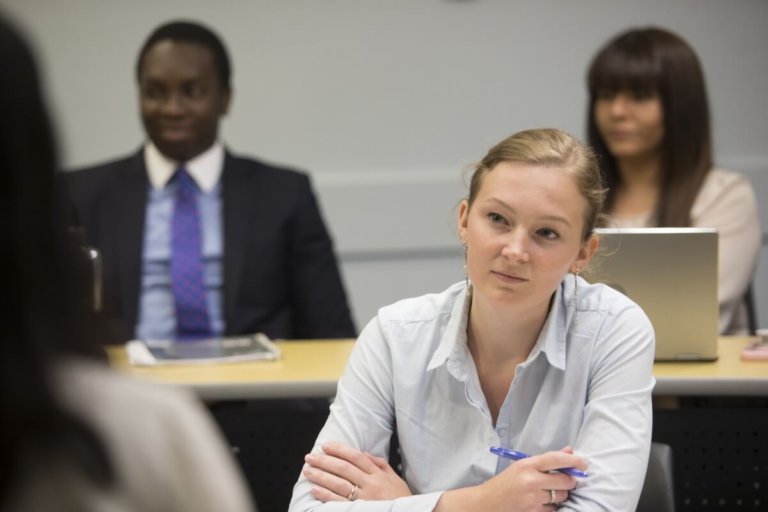
By 2030, up to 375 million people could be displaced by automation. This is the figure projected by the McKinsey Global Institute in the event of an early automation adoption scenario. Automation technologies could develop and be adopted even sooner than this.
The clock is ticking. Whether one is in a sector highly susceptible to automation or not, the Fourth Industrial Revolution will fundamentally alter the way we live, work and play.
Creating an MBA programme that will prepare graduates for this is the Faculty of Management at Canada’s Vancouver Island University (VIU).
Higher education may be accused of being slow in adapting to this new epoch, but not the MBA programme at VIU.
“Your professors will challenge you to learn about global business issues, business techniques and skills, to improve your personal skills and tools and to learn about managing and leading in the 21st Century,” VIU MBA director said.

Source: VIU, Faculty of Management
Recently redesigned, VIU’s MBA is disrupting the conservative educational model that has come to define the popular business programme today. Instead, its focus is on the future: graduating students who can manage the complex, diverse work environments, as well as lead the inevitable digital transformation to hit most, if not all industries.
VIU’s Faculty of Management is part of a group of business schools showing “resilience” in a volatile world, as described by the Association of MBAs (AMBA) in its 2019 MBA Application and Enrolment Report. These are the institutions that are adapting to the needs of future business leaders, providing more opportunities for talented individuals to progress within business management.
Its trump card? Technology.
As one of the most technologically integrated programmes in Canada, VIU has four dedicated technology-focused courses embedded in its MBA programme.
The first module kicks off with Technology 1: System Management, where students examine ways in which organisations use information technology to manage data and processes to inform managerial decisions. Then, in module Technology 2: Communication Tools, students get “an introduction to the use of information and communication technologies in order to create new opportunities such as higher productivity, innovation and increased business activity”.

Source: VIU, Faculty of Management
In Technology 3: Digital Behaviour, the digital landscape is studied as a cultural and social space to teach students about risk assessment, the difference between private and public behaviour and the impact that the participatory media consumption has on individuals, societies and industry. Finally, the last module Technology 4: Emerging Business Technology, looks into the way organisations evaluate, adopt and use emerging technologies to identify their potential benefits and determine how feasible they would be.
These modules are woven into the intensive 20-month, full-time programme which features other modules in Accounting, Economics, Finance, Management, Marketing and Research. In this innovative structure, students learn across disciplines within and between semesters.
Ultimately, MBA candidates here won’t just be business and management experts, but specialists on how technology will influence everything from human resources to digital media and surveillance capitalism.
Having students and faculty originating from all over the world helps too. This gives a more cosmopolitan feel to its campus supplementing the collegiate-like feel of its small class sizes. VIU is located in Nanaimo, a small growing and emerging multi-sector city in British Columbia. Nanaimo is a central hub of Vancouver Island, just off the coast of Vancouver, surrounded by Canada’s magnificent west coast.

Source: VIU, Faculty of Management
But more importantly, this multicultural campus and setting gives students the much valued global perspective for today’s business world.
Like technology, globalisation’s major influence in our modern society today is undeniable. Some of the most successful businesses today are those that have embraced it. And so they reap the many advantages diversity brings to an organisation, from increased profits and creativity to stronger governance to better problem-solving abilities. A study by the Boston Consulting Group found that companies with more diverse management teams have 19 percent higher revenues due to innovation.
Mirroring such organisations in its diverse campus, students from around the world studying at VIU’s MBA programme inspire one another with new business perspectives. They will be in demand at tech companies, start-ups and industries, where like the homogenous Silicon Valley, there is much improvement to be made in terms of diversity.
Add to this its close links with the community and industry, supported by career coaching throughout the programme, VIU’s MBA candidates will be able to truly embrace the diversity of the programme, the on-campus community, central Vancouver Island, the surrounding metropolitan centres and the broader global business community.

Source: VIU, Faculty of Management
The programme concludes with a four-month internship and an applied business project in Semester 5. Working with an industry mentor, VIU’s MBA candidates will identify a significant organisational problem that will be used to write an Applied Business Project under faculty supervision.
VIU offers the ideal MBA programme for the adventurous, the ambitious and the ones ready to take on what the digital age has yet to bring. If you’re seeking a non-traditional MBA in Canada to prep you for success, VIU’s MBA is the programme that offers it all.
Follow VIU Facebook, Twitter, YouTube, Instagram and LinkedIn
Liked this? Then you’ll love these…
Develop your business skills at VIU’s School of Business and Management
Canadian universities that help business students adapt to the future of work







